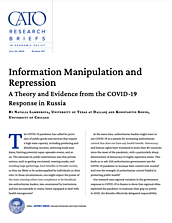The COVID-19 pandemic has called for provision of public goods and services that require a high state capacity, including producing and distributing vaccines, enforcing mask mandates, limiting potential super-spreader events, and so on. The rationale for public intervention was that private actions, such as getting vaccinated, wearing masks, and avoiding large gatherings, have benefits to broader society, so they are likely to be undersupplied by individuals on their own. In these circumstances, one might expect the power of the state coercing others into compliance to be beneficial. Are authoritarian leaders, less constrained by institutions and less accountable to voters, better equipped to deal with health emergencies?
At the same time, authoritarian leaders might want to use COVID-19 as a pretext for increasing authoritarian control that does not have any health benefit. Democracy and human rights have worsened in more than 80 countries since the onset of the pandemic, with a particularly sharp deterioration of democracy in highly repressive states. This leads us to ask: Did authoritarian governments use the COVID-19 pandemic to increase their control over society? And was the strength of authoritarian control helpful in protecting public health?
Our research uses regional variation in the government response to COVID-19 in Russia to show that regional elites exploited the pandemic to maintain their grip on power. In 2020, the Kremlin effectively delegated responsibility for handling the pandemic to regional governors. Though Russian regions share similar laws, language, and history, they vary significantly in the capacity of elites to provide public goods and maintain order, in the strengths of civil society, and in the quality of political institutions. We demonstrate that the extent of state information manipulation and arrests of activists is determined by the strength of the civil society and quality of regional institutions.
We measured information manipulation using a well-defined variable—the difference between officially reported COVID-19-related deaths and excess mortality over the same period. The truthfulness of reporting COVID-19-related deaths is a choice for state authorities, and there is massive evidence that these data were heavily manipulated. In contrast, excess mortality data—a measure of how unusually high deaths are—are much more reliable. Even in a weakly institutionalized environment, a death is recorded in many independent registers. Manipulating death statistics on a countrywide scale would require coordination of many independent institutions, including tax authorities, pension and social institutions, courts that manage inheritance, and others. Given that mortality data is typically well-understood and can be used to calculate reliable estimates of excess deaths, the difference between the reported COVID-19-related deaths and excess mortality is a ready proxy for the government’s information manipulation. Moreover, past research has identified that nondemocracies tend to heavily underreport COVID-19-related deaths.
The government’s use of information manipulation and repression during the pandemic was not innocuous. Previous research has shown that information manipulation negatively affected citizens’ self-reported compliance with public health guidance, their willingness to get vaccinated, and their willingness to recommend the vaccine to vulnerable friends and family. Our research shows that underreported COVID-19-related deaths in Russia, a propaganda tool, were correlated with citizens’ unwillingness to comply with self-isolation measures and therefore that underreporting contributed to pandemic harm. The authoritarian government’s supposed advantage in managing the pandemic—the ability to implement coercive public health measures—was compromised by the government’s actions to enhance its power.
We discovered that information manipulation by Russian regional authorities is dependent on the extent of Moscow’s political control. Our data reveal that regional legislatures with a strong United Russia (the ruling party) majority produce more information manipulation about COVID-19-related deaths in the region. The data also reveal that regions with higher-quality institutions produce less information manipulation. Our research shows that these suggestive results point to causal connections rather than simple correlations.
Another important issue in authoritarian politics is the relationship between information manipulation and repression, two main instruments of authoritarian control. Some researchers consider propaganda as a substitute for repression. In contrast, we provide empirical evidence that repression and informational control are natural complements to each other—repressing those who are most skeptical of the regime allows it to increase the volume of propaganda for the others.
Note
This research brief is based on Natalia Lamberova and Konstantin Sonin, “Information Manipulation and Repression: A Theory and Evidence from the COVID Response in Russia,” Becker Friedman Institute Working Paper no. 2022- 101, July 27, 2022.

This work is licensed under a Creative Commons Attribution-NonCommercial-ShareAlike 4.0 International License.
